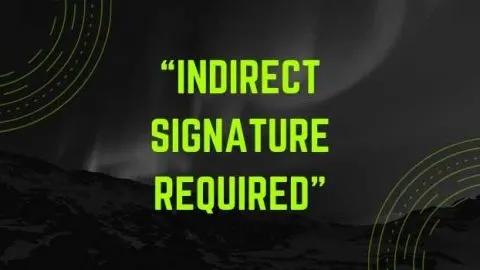Common words are sometimes used in combinations that seem contradictory.
“Exquisitely vicious” is one example that shows up sometimes in fiction.
However, even the most poetic flight of fancy is no match for this article’s topic, the confusing phrase “indirect signature required.”
How can a signature be indirect? Read on to find out.
What does “indirect signature required” mean?
The phrase “indirect signature required” is only used by Fed Ex. In short, it means that somebody other than the intended recipient signed a statement agreeing to receive a package or other piece of mail. The signature itself is not indirect, in other words, but rather the signature was made by someone other than the “direct” recipient of the delivery. While the exact phrase is not used by other delivery services, some may offer similar types of signature requirements.
What is a signature?
A signature is essentially a type of written name which formally identifies the person writing. It differs from printed writing, where the purpose is to create letters in a uniform, easily legible way. However, it also differs from an autograph, where the uniqueness is primarily there for artistic purposes.
The purpose of a signature is more forma, in other words. It serves as proof of the signer’s identity. For this reason, signatures are often required when receiving important mail, when signing contracts and in other cases where it is essential to confirm the identity of the signer.
According to a paper from MIT, signatures are first mentioned in the Talmud, the central text of Jewish religious law and theology, in roughly the year 500 CE.
Technology such as telegraphs and the Internet have complicated what does and does not count as a signature, and today signatures may be electronic as well as handwritten.
What is an “indirect signature”?
At first glance, this phrase makes no sense. You can either write a signature or you can not write a signature.
The idea that a signature might be “indirect” is definitely counter-intuitive. To understand what “indirect signature required” means, it’s necessary to look at the only place which seems to use this phrase, FedEx.
FedEx is an international delivery service, although it operates primarily in the United States of America.
Because FedEx, like all delivery services, is often tasked with sending valuable items and important documents from one person to another, they offer a variety of signature options.
One of these options is “indirect signature required.” To select this option, the actual recipient of a delivery must log into FedEx’s management system and grant somebody else the ability to sign for the package.
In other words, what “indirect signature required” means is just that the signature belongs to somebody other than the recipient of a package or other delivery.
The phrase “alternative signature required” would seem to make more sense, as it’s not the signature that is indirect so much as the person signing for it is different.
However, you can think of the recipient as still indirectly authorizing the signature by signing into the FedEx management system and granting this other person the ability to sign.
Viewed in that light, it makes sense that the signature could be considered indirect.

Does anyone else use the phrase “indirect signature required”?
Written English pertaining to mail and deliver is often confusing and highly specialized, and this phrase is no exception. Unlike more common phrases like “address line 1,” however, this one is rare.
No other delivery company seems to use this particular phrase to describe their signature options for deliveries, but you may still see it in other places.
Many online shops, for example, allow customers to request an indirect signature when entering the delivery options they would like to use when placing an order.
On the other hand, these other uses often say that it will only work if it’s supported by the carrier (that is, the company delivering the item).
Given that FedEx seems to be the only major delivery service which does support an indirect signature, you probably don’t need to worry overly much about encountering the phrase elsewhere, or asking what “indirect signature required” means in other contexts.

Hey fellow Linguaholics! It’s me, Marcel. I am the proud owner of linguaholic.com. Languages have always been my passion and I have studied Linguistics, Computational Linguistics and Sinology at the University of Zurich. It is my utmost pleasure to share with all of you guys what I know about languages and linguistics in general.

